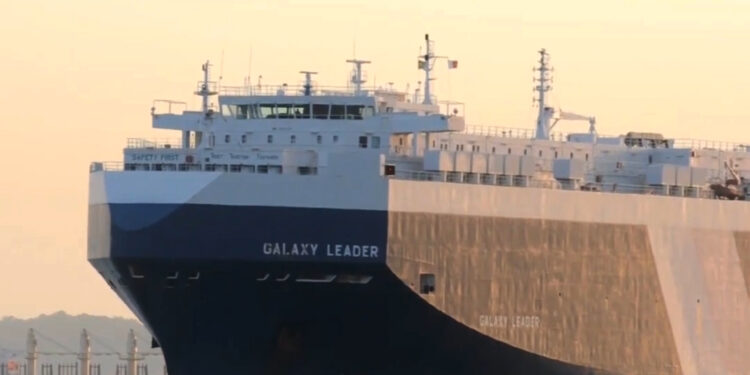Japanese shipping companies began changing their routes after the Houthis targeted commercial ships in the Red Sea that were Israeli or heading to Israel. The official Japanese channel “NHK” explained that the companies “Nippon Yusen” and “Mitsu OSK Lines” changed the course of their ships heading to and coming from Europe to avoid the possibility of the ships being targeted by the Houthis in the Red Sea, noting that the ships were directed to take the Ras al-Raja route. Good in South Africa.
Other Japanese media reported that K-Line and Ocean Network Express also changed the course of their ships for the same reason.
The Houthi group in Yemen says that it seeks – by targeting Israeli ships or those heading to Israel – to allow the entry of aid into the besieged Gaza Strip, which is subject to continuous aggression from the Israeli occupation, which has led to very large destruction, the killing of more than 20,000, and the injury of more than 54,000 others.
Thus, other Japanese companies followed that took the same measures, including the French “CMA-CGM”, the Belgian Oil Tanker Company “Euronav”, the Taiwanese Evergreen, Frontline and Gram Car Carriers (Norway), the German Hapag-Lloyd, and “HMM”. South Korea’s Hoag Autoliners, Norway’s MSC and Ocean Network Express (Japan), Orient Overseas Container Line (Hong Kong), Linnaeus Wilhelmsen of Norway, Yang Ming of Taiwan, and others.
Maersk is back
On the other hand, the Danish shipping company Maersk said yesterday that it is preparing to resume its operations in the Red Sea and the Gulf of Aden, after deploying a US-led military force aimed at ensuring the safety of trade in the region.
This giant shipping company had temporarily stopped sending ships through the Bab al-Mandab Strait this month due to attacks on its ships.
Last Tuesday, the United States launched a multinational operation under the name “Guardian of Prosperity” to protect trade in the Red Sea from Houthi drone and missile attacks on ships.
The Pentagon said on Thursday that more than 20 countries in total have agreed to participate in the coalition. However, the new total indicates that at least 8 of the countries that have decided to join the effort are refusing to disclose their participation publicly, a sign of the political sensitivities of the process.
Maersk said – in a statement – that it had received confirmation, as of yesterday, Sunday, that the previously announced multinational security initiative had been established and deployed to allow maritime trade to pass through the Red Sea and the Gulf of Aden.
She added, “With the activation of this initiative, we are preparing to allow ships heading to the east and west to resume transit through the Red Sea.”
Maersk said that it would announce more details in the coming days, but indicated that it may resort again to diverting ships from the Red Sea, according to safety conditions.
Doubts
This means that Maersk, among other companies, is still skeptical about the outcome of the new alliance’s work. Last week, Reuters quoted Corey Ranselm, CEO of the British maritime risk and security consultancy Dryad Global, as saying that a number of things are still unknown regarding the alliance, including the rules. The engagement of naval warships, and the actual protection plan they will provide.
He added that the incident area is fairly small, however, providing protection for commercial ships in this area could be a major task depending on the number of ships, along with any changes in the Houthis’ attack tactics.
Ranselm expected that the threat facing shipping would continue in the foreseeable future as long as the war in Gaza continued.
Dangerous scenario
Logistics expert Wael Qaddour told Al Jazeera Net that shipping traffic tensions in the Red Sea could stop immediately after the end of the war on Gaza, but the Houthi group’s targeting will likely not stop if the war continues, and therefore the coalition will work to intercept marches or projectiles towards ships.
But he ruled out that the coalition would succeed in intercepting all the attacks, which means that the danger may still exist, which is a “dangerous scenario.”
He added that to protect ships, given previous similar cases, it could be done for each ship individually, which is expensive, and it could take the form of convoys, which means that each group of ships is protected by a number of warships.
In this context, Houthi spokesman Muhammad Abdel Salam said yesterday that an American warship tried to fire on a reconnaissance plane belonging to the group, which was carrying out “reconnaissance” activity in the Red Sea, but one of the missiles exploded near a ship heading south.
He added, “The Red Sea will be a burning arena if America and its allies continue in their way of bullying, and the countries bordering the Red Sea must realize the reality of the dangers that threaten their national security.”



